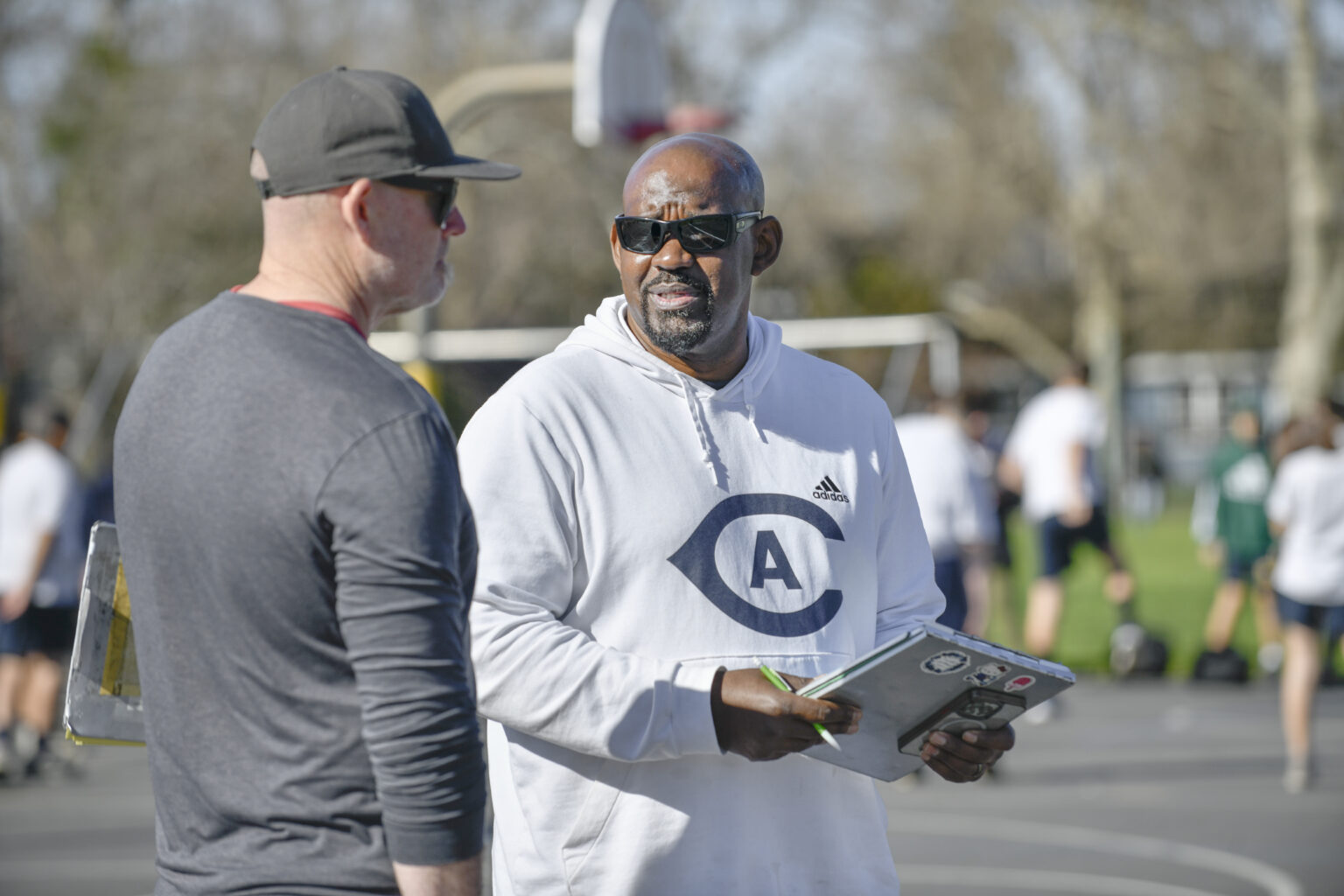Petrina Miller remembers, as a young teacher in Los Angeles Unified, helping another teacher during district testing and noticing that the teacher was giving Black students and other students of color the answers. Miller asked her why she was doing that.
“Let them have a productive struggle,” Miller said. “Let them try, and whatever score they get is what they get. And that’s fine.”
The teacher said, “Poor little babies, they don’t know any better,” in a way that made Miller uncomfortable. On another day, the same teacher used a racist term to refer to Miller, who is Black.
The incidents were reported to the principal, but the teacher continued to work at the school. Miller isn’t sure if she was ever disciplined.
California and other states have been trying to recruit and retain Black teachers for years, but the numbers aren’t improving. Among the factors impeding this goal, along with the cost of teacher preparation, is a lack of support and respect for Black teachers once they are in the classroom, according to teachers.
“Black teachers leave the profession because they don’t feel supported for what they are able to bring to the table in terms of their unique experiences, and they leave because of the fact that they are not seen as equal to their colleagues,” said Brenda Walker, a Black teacher who is president of Associated Chino Teachers.
In the 2020-21 school year, the most recent data available, 3.8% of all teachers in California were Black, according to the National Center for Education Statistics. Black students made up 5.2% of the state’s student population that year, according to the California Department of Education.
Number of Black teachers declining nationwide
The state is doing better than the nation as a whole. Just over 6% of U.S. teachers were Black in the 2021-21 school year; 1.3% of U.S. teachers were Black men. Black students made up 15% of the students that year. The number of Black teachers in the U.S. has been declining for years.
A growing body of research shows that having a teacher of color in the classroom is important to students of color, resulting in higher test scores and a greater likelihood of graduating from college. Research also shows that having Black teachers in the classroom has a positive impact on all students, regardless of their race, said Travis Bristol, an associate professor of education at UC Berkeley, who has done extensive research on the topic.
“The framing, I think historically, has been that Black teachers are just good for Black students,” Bristol said. “And while that is true, it is also true that Black teachers are lowering the suspension rates of students who are not Black.”
The first hurdle for potential Black teachers comes early, while they are still students in K-12 schools, Bristol said.
“We suspend and expel a disproportionate number of Black children,” he said. “There is evidence, there’s research that if you are suspended and expelled, it decreases the likelihood that you then move on to pursue a higher education.”

The cost of teacher preparation is a major roadblock to a credential. Tuition, the cost of required tests and unpaid student teaching have kept many Black people out of the profession, according to teachers interviewed by EdSource.
Black teachers owe an average of $43,000 more in college debt than white graduates 12 years after graduation, according to the Learning Policy Institute, a nonprofit education research organization. The low salary of new teachers and the high amount of college debt associated with five years of college can dissuade Black people from becoming teachers. Many also aren’t financially able to quit their jobs to complete the 600 hours of unpaid student teaching required to complete a credential.
Brooke Sims, a first-grade teacher in Stockton, who also serves as a mentor teacher, says she’s still struggling to repay student loans after 16 years of teaching.
“I definitely believe free classes, free courses or free programs … would help recruit and retain more teachers,” she said.
Lack of funds pushes Black teachers into internships
To help pay the bills, many Black teachers take an internship instead of the traditional route to a credential, which includes student teaching with a mentor teacher. Interns work as full-time teachers while undergoing teacher preparation. They are paid, but they are put into classrooms with little preparation during the first few years of teaching.
“They hire you on Friday, you are in a classroom on Monday,” said Miller, who started her career with LA Unified as an intern 26 years ago. “You have maybe a week. It felt that quick. Along the way, you went to teach, went to training and learned on the job.”
A lack of mentors meant Miller met with the one appointed by the program about once every three months. Later, a traveling mentor was hired by the program and visited the school monthly, but primarily to drop off materials, she said.
“As a teacher of color, it was a struggle,” Miller said. “I had to try to find my own support from someone else.”
Turnover rates in K–12 schools for teachers of color are higher than their white counterparts. In 2022 the turnover rate for Black teachers was 22%. The turnover rate for white teachers is 15%, according to the National Center for Education Statistics. Black teachers interviewed for the 2023 State of the American Teacher Survey reported significantly higher rates of burnout than white teachers and were more likely to report low salaries as a source of stress.
Teachers sometimes feel undervalued, disrespected
Teachers interviewed by EdSource said their work has been scrutinized more closely than their peers, and they have felt disrespected or undervalued because they are Black.
“What we know is that, because Black teachers are positioned, in particular Black men teachers, are positioned as enforcers first and teacher second, that they’re not always viewed by their white colleagues as having expertise as it relates to teaching and learning,” Bristol said.
Krystle Goff, a targeted student population coordinator at 122nd Street Elementary in Los Angeles, says Black teachers are under pressure to be perfect. They feel they have to continually prove themselves to administrators and other teachers. Black teachers aren’t given the same grace as their counterparts, she said.
“It feels like we’re coming up short. It feels like we’re not meeting the criteria, and so, we exit the field altogether,” said Goff, who is responsible for the redesignation of English learners at the school.
The heightened scrutiny and lack of support of Black teachers comes from colleagues of all races, including fellow Black teachers and administrators, Goff said.
“I think that because we work for a system that sort of perpetuates that cycle of power and just white supremacy, we don’t know how to support (one another), Goff said. … “You don’t even realize that how you’re interacting with each other is just not productive.”
Black teachers say they sometimes feel dismissed by people who question whether they are teachers while they are carrying out their duties.
“I’ve shown up to field trips where I was the teacher that had arranged the field trip, and I’ve got my backpack on,” Sims said. “I’ve got a badge on with keys. I have a T-shirt that matches the children’s T-shirt that says I belong to this school. And I’m like, ‘Hi, I’m Ms. Sims. I called. We’re here for our field trip.’ ‘Well, (they ask). ‘Are youthe teacher’?”
“We’re automatically, a lot of times, dismissed, or it’s assumed that we’re not the teacher,” said Preston Jackson, a physical education teacher at California Middle School in Sacramento. “(They assume) we’re the campus monitor, or we’re the custodian. So right off the bat, you’re having to fight that type of bias that is still out there because there aren’t that many Black teachers.”
Being a teacher is hard, but being a Black teacher is harder, Jackson said.
“Ninety percent you probably are going to be on a site where you’re the only one there,” Jackson said. “And so, you’re not going to have someone there that has gone through a similar process, because being a Black teacher is a completely different situation.”
Inadequate support, feelings of isolation
A recent survey of 128 former and current Black teachers by the Black Educator Advocates Network titled “What Schools must Do to Retain Black Educators,” found that these teachers face challenges in expressing their cultural identity, ranging from discomfort with colleagues’ comments, to a lack of support in addressing racism within their schools. Some teachers mentioned feeling isolated or encountering resistance when discussing anti-Blackness or organizing cultural events.
“Just as all students benefit from the experience of having classroom teachers from diverse backgrounds, school districts benefit from educators who bring their expansive experiences of many cultures to their school communities,” Chino Valley’s Walker told EdSource. “But, showing up as our true and authentic selves is not always understood and appreciated.
“School districts should make implicit bias training mandatory for all employees, not just once, but on an annual basis.”
Sims agrees that implicit bias training is important, but she remembers attending a training session that left her feeling uncomfortable and angry. She remembers a discussion about students who couldn’t afford to buy clothes that complied with the school’s dress code. One teacher at the training said: “These kids” can’t come to school prepared, but they come to school with brand-new Jordans, Sims said.
“Well, I know what that coded language means when you’re talking about children wearing Jordans,” Sims said. “I know you’re talking about Black children. Obviously, everybody wears Jordans. But that was the time that I got really heated. And I said to myself, ‘Brooke, walk out the room, get some air because part of you wants to correct that person.’ And I probably should have.”
Since that incident, Sims has become part of her union’s executive board and has taken training from the California Teachers Association on how to deal with racist comments and microaggression.
“I’m just learning to be OK to do that at 41 years old,” she said.
Cultural brokering often expected
Black teachers say they are often saddled with extra responsibilities, including serving as liaisons to Black families and disciplining Black students because of their race.

More than half of the respondents to the Black Educator Advocates Network survey said that because of their race, they are expected to educate others about racism and are expected to lead professional development sessions, teach classes on Black identity and address racism in various ways at their schools.
Collectively, the experiences of Black educators, coupled with being tasked with working with Black families disproportionately impacted by the pandemic, have left Black teachers exhausted, Alicia Simba, a transitional kindergarten teacher in Oakland Unified, told EdSource.
“It’s difficult when kids are carrying so much and parents are carrying so much, and wanting to be there to help them can be physically exhausting, as well as emotionally exhausting,” Simba said. “I think a lot of conversation around (teacher) burnout comes from that.”
Black teachers may feel they have to leave the profession to preserve their emotional well-being, even if they love the kids and the community and love to teach, Simba said, adding that teachers who work in schools with a large population of Black students also put in extra work because those schools are usually under-resourced.
“I’m working longer hours because we don’t have the cleaning staff that other schools might have, or a regular custodian like other schools might have,” Simba said. “So, I’m spending extra time having to clean up, or maybe I’m spending extra money on getting books for the kids because our budget isn’t as big as other schools or, with other schools, they might fundraise.”
